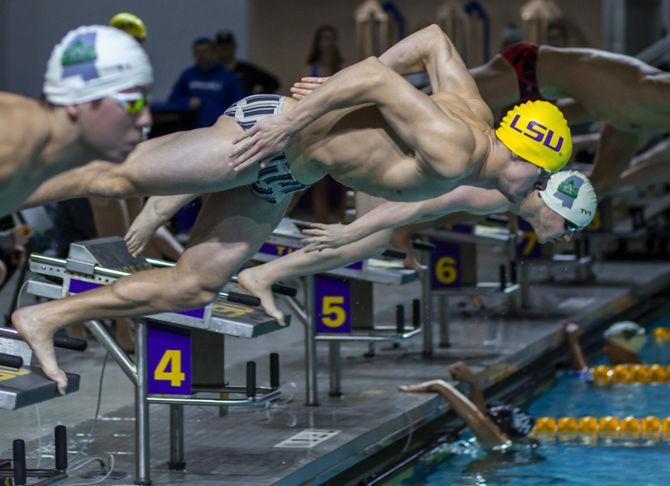It’s not just determination in the pool that leads to the LSU swim and dive team’s success; it’s what they do out of the pool that counts.
There is no doubt that there is a lot of work that goes into being a student athlete, from waking up at early hours of the morning to balancing school and social life. How do they maintain it all?
Swimmers and divers, although on the same team, have very different practices and schedules.
Swimming has a large variety of events, from long-distance swimming to sprinting, which separates the athletes training techniques. The divers are a smaller group and are trained by a different coach and in different ways.
This difference dictates what each athlete does outside of the pool.
The most obvious difference in these sports is the energy expenditure that swimmers use in comparison to divers. This impacts how each athlete feels before and after practices as well as the amount of time they have off.
“I think swimmers’ workouts are aerobic-based, so we need a little more food and sleep between practices to perform at a high level,” said Helen Grossman, a senior swimmer and team captain of the women’s swim and dive team.
“Diving focuses on precision and is closely related to gymnastics and trampolining in its artistic aspect. There are more mentally-challenging aspects in diving as it is scary to flip and twist from high heights,” said Aimee Wilson, a sophomore diver and team captain.
“I feel like diving is more mental,” said Lexi Daniels, a senior swimmer. “In between practices, I feel like they need to clear their mind. Swimmers, I feel like it’s more endurance, so they need to make sure their muscles are relaxed.”
With any sport, especially at a high level, there are a few universal requirements from athletes to follow to be successful.
These athletes train twice a day most days, six days a week. This can be taxing on the mind and the body, so athletes make sure they do everything they can to avoid getting sick or overwhelmed.
Healthy practices such as proper diets, hydration and adequate sleep are necessary for these athletes. Other practices such as seeing a sports therapist or psychologist, yoga, ballet, extra activity and meditation are all examples of how the swimmers stay in top form.
“I’ve recently started meditating before I go to sleep and when I feel anxious about swimming or school,” Grossman said. “It’s an awesome tool that helps me focus leading up to big meets or races.”
There are also certain sacrifices that athletes have to make to perform well and balance their school work and training, however, most athletes don’t consider these things sacrifices in the grand scheme of things.
“Growing up doing any sport at a high level comes with sacrifices,” Wilson said. “I think for me the biggest sacrifices I have made have been not always being able to go to social events with friends or a lot of vacations growing up.
“At the end of the day I think it was worth it, and all the hard work I have put into my sport has taken me to the level I am now and given me so many amazing opportunities that other people don’t always get.”
What they do differently: Multiple nuances for LSU swimming, diving athletes
November 18, 2019
LSU sophomore Brian McGroarty swims the 200-yard freestyle event during the Tigers’ victory in the LSU Natatorium, on Saturday, Jan. 12, 2019.






